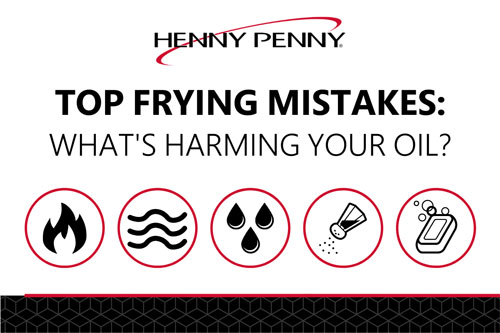
The most recent National Restaurant News 10 Fastest-Growing Restaurant Chains in America report shows that nine out of the top ten restaurants serve fried food items on their menu. The Top 500 Chain Restaurant Report for 2021 from foodservice research group Technomic shows that more than 70% of the top chains serve fried foods.
Americans loved their fried foods.
Besides the classics, fried pickles, sweet potato and waffle fries, and even fried mac and cheese bites are surprising and delighting customers. The continued popularity of fried foods and their ability to drive consumer preference makes a smart frying operation all that much more important. It is about more than just producing a tasty product, however. To create exceptional customer experiences and run an efficient kitchen, you need to maximize the life span of your frying oil.
There are several ways to accomplish these goals but none of them will be possible you’re unknowingly introducing harmful elements to your oil.
Frying oil is one of the most expensive food items in your kitchen. If you are not protecting your fryer oil, you are wasting it. Fortunately, we know precisely which elements can harm your oil, and we know how to avoid or, at the very least, combat these common oil “enemies.”
To help in identifying these enemies, remember the acronym HAMSS and you will be on your way to saving money and improving quality with your commercial kitchen fryer operations.
H = Heat
When you are not actively using the fryer, turn the temperature down. Any time you can lower the temperature by 18 degrees Fahrenheit, you effectively double the life of your oil. Likely, the time needed to return it to the appropriate cooking set point is a fair exchange for the money saved.
SOLUTION: The best practice to lower your cooking oil temperature is to allow the oil to passively cool instead of manually lowering the set point of the oil. Turning your Henny Penny fryer to “Idle Mode” will allow your oil to drop in temperature and avoid over-exposure to the damaging qualities of heat that can degrade your oil quality.
On Henny Penny fryers operators can also select “Melt Mode” to avoid raising the temperature of your oil too quickly. When you heat oil rapidly, it can damage the oil and limit its lifespan. The Melt Mode feature will gradually increase the temperature of your oil and give you the benefit of added oil life.
A = Air
Exposure to air does diminish oil quality over time/Oxidation occurs when oil comes in contact with air, so cover your oil with vat covers when not in use, such as at night or during off-peak hours. This will help extend the life of your cooking oil.
SOLUTION: Once filtered, do not needlessly pump oil through the filter. This introduces more air and will increase the damage to your oil. Five to ten minutes of polishing per day is optimal.
M = Moisture
Contact with moisture is the biggest culprit in the deterioration of cooking oil.
Every item you fry contains moisture, especially proteins. The process of frying extracts moisture from the items being cooked, which enters and damages the oil. There are still precautions that can be taken to avoid introducing excess moisture to your oil.
SOLUTION: Never fill baskets directly over the fryer. Always shake out water or ice crystals before dropping in any product.
S = Salt
Salt is like sand; it gets in everything. As salt breaks down oil and causes foaming, it’s best to keep it away from your fryer. Review your kitchen’s workflow to ensure that food items are being seasoned after the fryer and that brined items are drained adequately before being placed in the vat.
SOLUTION: Never salt directly above the fryer vat, instead try integrating a procedure of salting product at a station.
S = Soap
Soaps and detergents can rapidly break down oil. Alkaline liquids, such as cleaning chemicals, create soap when combined with oil. Soap reacts with oil and causes off flavors, dark colors, off odors, and foaming.
SOLUTION: Use only the cleaning solutions recommended by the fryer manufacturer and follow the directions carefully. Keep lid covers in place especially during clean up and always use a vinegar rinse to neutralize the detergent.
Fighting the enemies of oil is just one way to maximize oil life – when frying is a key part of your operation, avoiding common mistakes can improve your food quality, productivity, and bottom line. Learn how by downloading the free guide from the frying experts at Henny Penny: The Top 5 Mistakes to Avoid in Your Frying Program (and How to Fix Them).



